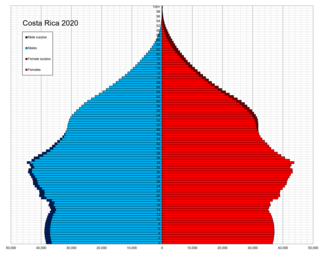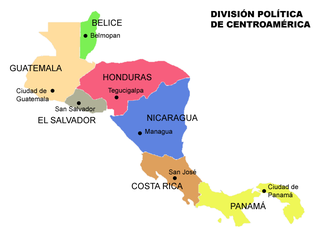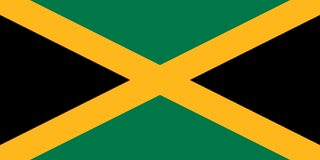Related Research Articles

Costa Rica, officially the Republic of Costa Rica, is a country in Central America, bordered by Nicaragua to the north, the Caribbean Sea to the northeast, Panama to the southeast, the Pacific Ocean to the southwest, and maritime border with Ecuador to the south of Cocos Island. It has a population of around five million in a land area of 51,060 km2 (19,710 sq mi). An estimated 333,980 people live in the capital and largest city, San José, with around two million people in the surrounding metropolitan area.

This article is about the demographic features of the population of Costa Rica, including population density, ethnicity, education level, health of the populace, economic status, religious affiliations and other aspects of the population.

Costa Rican culture has been heavily influenced by Spanish culture ever since the Spanish colonization of the Americas including the territory which today forms Costa Rica. Parts of the country have other strong cultural influences, including the Caribbean province of Limón and the Cordillera de Talamanca which are influenced by Jamaican immigrants and indigenous native people, respectively.
Edén Atanacio Pastora Gómez was a Nicaraguan politician and guerrilla who ran for president as the candidate of the Alternative for Change (AC) party in the 2006 general elections. In the years prior to the fall of the Somoza regime, Pastora was the leader of the Southern Front, the largest militia in southern Nicaragua, second only to the FSLN in the north. Pastora was nicknamed Comandante Cero.

Monteverde is a district of the Puntarenas canton, in the Puntarenas province of Costa Rica. It is located in the Cordillera de Tilarán mountain range. Roughly a four-hour drive from the Central Valley, Monteverde is one of the country's major ecotourism destinations. The area is host to the Monteverde Cloud Forest Reserve and several other natural attractions, which draw considerable numbers of tourists and naturalists.

Nicaraguans are people inhabiting in, originating or having significant heritage from Nicaragua. Most Nicaraguans live in Nicaragua, although there is also a significant Nicaraguan diaspora, particularly in the United States and Costa Rica with smaller communities in other countries around the world. There are also people living in Nicaragua who are not Nicaraguans because they were not born or raised in Nicaragua nor have they gained citizenship.

The Austrian Service Abroad is a non-profit organization founded by Dr. Andreas Maislinger in 1998 sending young Austrians to work in partner institutions worldwide serving Holocaust commemoration in form of the Gedenkdienst, supporting vulnerable social groups and sustainability initiatives in form of the Austrian Social Service and realizing projects of peace within the framework of the Austrian Peace Service. Its services aim at the permanence of life on earth. The Austrian Service Abroad carries and promotes the idea of the House of Responsibility for the birthplace of Adolf Hitler in Braunau am Inn. The Austrian Service Abroad is the issuer of the annually conferred Austrian Holocaust Memorial Award. The program is funded by the Austrian government.
The Austrian Social Service is part of the Austrian Service Abroad founded by Dr. Andreas Maislinger in 1998. It offers the possibility to substitute the compulsory military service in Austria with a 10-months service abroad and provides a platform for volunteering services.
The 1980s were the backdrop to a savage civil war which saw conflict destroy the nation of Nicaragua, and the lives of 50,000+ civilians in the process. The multicultural country of Nicaragua experienced an excessive outpouring of citizens who fled the nation for their own security. Although many Nicaraguans live in Spain, Mexico, Panama and El Salvador, the majority of Nicaraguans living abroad are in Costa Rica and the United States. Nicaragua has the second largest number in Central America of people living abroad, almost 1,200,000.
UNAPROA was founded by deputies of six village communities in the Brunca Region in the year 1995. This association has the ambition of promoting the organic agriculture and green tourism. Its domicile is situated in El General in Costa Rica. The members are mostly campesinos, who husband small fields at the Talamanca mountains. Meanwhile the community has grown and now embraces deputies of forty villages, one of them indigenous. UNAPROA has cooperated for several years with the Austrian magazine Grünen Bildungswerkstatt.
La Gamba is a village in the Guaycará District of Golfito canton, which is part of Puntarenas Province of Costa Rica. Village inhabitants are employed in agriculture and in jobs offered in cities such as Golfito and Rio Claro.

Central America is a subregion of the Americas formed by six Latin American countries and one (officially) Anglo-American country, Belize. As an isthmus it connects South America with the remainder of mainland North America, and comprises the following countries : Belize, Guatemala, Honduras, El Salvador, Nicaragua, Costa Rica, and Panama.

Field Station La Gamba, in the “Rainforest of the Austrians” in Costa Rica, is an Austrian research, teaching and continuing-education institution, whose mission is to contribute to research on tropical rainforests, to generate interest in conservation and in rainforest research, and to give interested persons an opportunity to deepen their appreciation of nature within the rainforest.

Tourism in Nicaragua has grown considerably recently, and it is now the second largest industry in the nation. Nicaraguan President Daniel Ortega has stated his intention to use tourism to combat poverty throughout the country.

The University of North Carolina School of Social Work is a graduate school offering M.S.W. and Ph.D. degrees. Also offered are dual degree programs coordinated jointly with UNC's School of Public Health, School of Law, School of Government, and Duke University's Divinity School. In 2008, U.S. News & World Report ranked the School of Social Work fourth among social work programs at public universities and eighth out of 165 programs nationwide. The mission of the UNC School of Social Work is to expand knowledge regarding social problems and programs, to educate social workers for advanced practice, and to provide leadership in the development of socially and economically just policies and programs that strengthen individuals, families, groups, organizations, and communities.
Academy for Global Exploration (AGE) is a college preparatory school traveling high school for grades 9 through 12 based in Ashland, Oregon, United States. AGE spends half of each semester overseas in such countries as Greece, Japan, South Africa, Nicaragua, Costa Rica, Peru and others.

The following is an alphabetical list of topics related to the Republic of Costa Rica.

Jamaicans are the citizens of Jamaica and their descendants in the Jamaican diaspora. The vast majority of Jamaicans are of African descent, with minorities of Europeans, East Indians, Chinese, Middle Eastern, and others of mixed ancestry. The bulk of the Jamaican diaspora resides in other Anglophone countries, namely Canada, the United States and the United Kingdom and, to a lesser extent, other Caribbean countries and Commonwealth realms. Outside of Anglophone countries, the largest Jamaican diaspora community lives in Costa Rica, where Jamaicans make up a significant percentage of the population.
The Longo Maï Co-operatives are a network of agricultural co-operatives with an anti-capitalist ideological focus. Founded in 1973 in Limans, France, the network has spread in Europe and to Central America.

Indigenous people of Costa Rica, or Native Costa Ricans, are the people who lived in what is now Costa Rica prior to European and African contact and the descendants of those peoples. About 114,000 indigenous people live in the country, comprising 2.4% of the total population. Indigenous Costa Ricans strive to keep their cultural traditions and language alive.
References
This article needs additional citations for verification .(January 2021) |